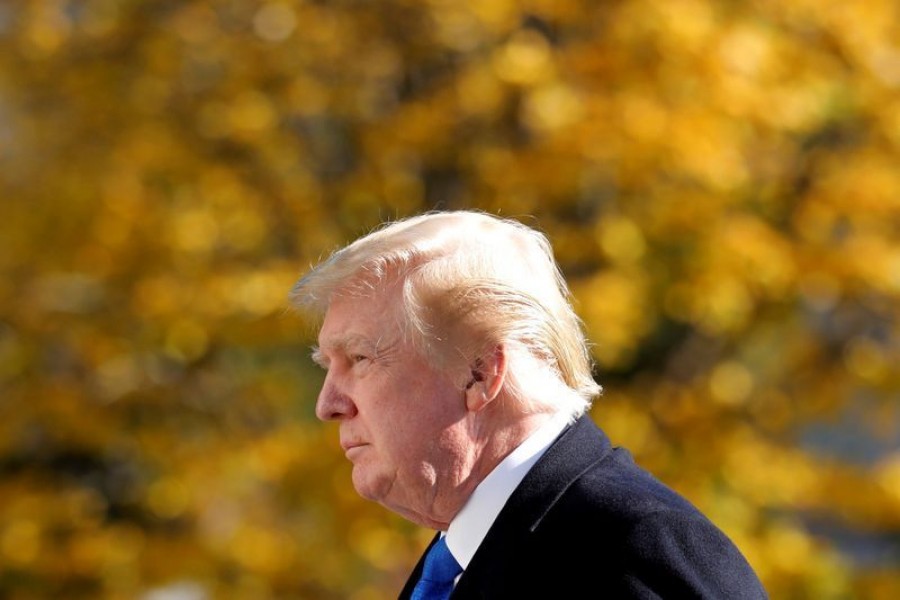US President Donald Trump’s reshaping of the federal judiciary has done little to help him win lawsuits challenging the election outcome, with Trump appointees rebuffing him and the US Supreme Court showing little interest in getting involved.
An appeals court judge appointed by Trump, a Republican, on Friday ruled against his campaign’s effort to overturn President-elect Joe Biden’s win in Pennsylvania based on unsupported allegations of voter fraud.
“Free, fair elections are the lifeblood of our democracy,” Judge Stephanos Bibas wrote on behalf of a unanimous US 3rd Circuit Court of Appeals panel. “Charges require specific allegations and then proof. We have neither here.”
Two judges appointed by President George W. Bush, also a Republican, signed onto Bibas’ decision.
Bibas is one of 53 judges Trump have been appointed to the federal appeals courts since 2016. By comparison, President Barack Obama appointed 55 in eight years. Trump has appointed roughly a quarter of all trial-level federal judges.
“The Trump administration has been so efficient at confirming judges, but it’s a real mistake to think that just because you appointed someone they will rule in your favor in an election case,” said Jessica Levinson, a professor at Loyola Law School in Los Angeles.
Trump’s campaign and his allies, including Republican lawmakers and activists, have filed more than 40 lawsuits in state and federal courts in an effort to overturn Democrat Biden’s victory in the November 3 election.
The 13 federal cases have had little success so far. Several have been withdrawn. Three, including the case Bibas heard on appeal, have been dismissed. One, concerning poll observer access in Philadelphia, resulted in a settlement after a judge rebuked Trump’s lawyers.
Ultimately, Trump’s biggest problem is his arguments are so shaky that it is hard to find a sympathetic judge, Levinson said.
“These cases are an easy way for judges to show judicial independence,” Levinson said. “These cases are so frivolous.”
In one instance, a Trump appointee dismissed a lawsuit brought by conservative lawyer Lin Wood seeking to halt certification of Biden’s victory in Georgia.
“To halt the certification at literally the 11th hour would breed confusion and disenfranchisement that I find have no basis in fact and law,” US District Judge Steven Grimberg in Atlanta wrote on November 19.
Trump campaign legal adviser Jenna Ellis said in a statement that the Trump campaign has been denied the opportunity to fully present its evidence in court.
“Every American who cares about our constitutional system and free and fair elections should demand a full adjudication on the merits and a remedy for the corruption that has occurred, whether in court or state legislatures,” Ellis said.
Meanwhile, the US Supreme Court has for weeks sat on a request by Pennsylvania Republicans that it overturn a September decision by the state’s highest court allowing election officials to count mail-in ballots that arrived after Election Day. The Trump campaign has a pending request to intervene in that case.
Trump appointed three of the Supreme Court’s nine members: Justices Neil Gorsuch, Brett Kavanaugh and most recently Amy Coney Barrett.
Barrett joined the court a week before the election, creating a 6-3 conservative majority.
Trump repeatedly said he expected the court to decide the outcome of the election while also raising doubts, without providing evidence, that the large number of mail-in ballots used because of the coronavirus pandemic would lead to fraud.
“I think this (election) will end up in the Supreme Court, and I think it’s very important that we have nine justices,” Trump told reporters at a White House event in September.
Trump struck a markedly different tone on Sunday, saying in a Fox News interview that he had an increasingly narrow path to overturning Biden’s victory in court.
“Well, the problem is, it’s hard to get into the Supreme Court,” Trump said.
Federal judges, in general, are reluctant to appear to be interfering in elections, legal experts said. And, in the case of Trump-appointed judges, their priorities may be elsewhere, like broadening protections for religious freedoms.
“Just because you appoint somebody doesn’t mean that you own them,” said Carl Tobias, a law professor at the University of Richmond.


